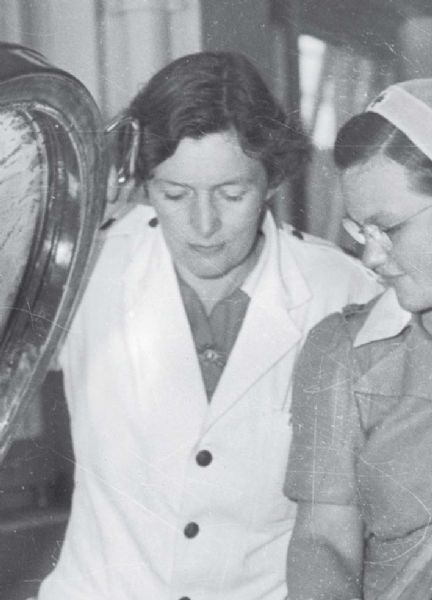One of Australia’s pioneer dietitians—Audrey Cahn—was instrumental in bringing nutrition to be the well regarded, prestigious research and study discipline that it is today.
Having grown up on the grounds of Melbourne University, Audrey gained her initial interest in nutrition and dietetics from her parents: both of whom introduced dietetic training to the university in the 1930s. Her father, William Osborne—a medical professor with broad interests—had a particular interest in nutrition, and gave public ‘extension’ lectures on the rewards of healthy eating. Her mother, Ethel Osborne was also medically trained and had investigated hospital dietary departments in the US, with the aim of applying similar principles in Australia. Audrey and her three siblings were encouraged in both physical and intellectual pursuits; no distinction was made on a gender basis.In 1929 Audrey married Leslie Cahn, an architect. They later had twin girls—Judy and Jill.
Image: Australian War Memorial Picture Collection – http://cas.awm.gov.au/item/1376060
Audrey Cahn’s career commenced in the late 1920s, when she became the first female student to complete a Bachelor of Agricultural Science at the University of Melbourne. Early on, she declined a job offer from the State Department of Agriculture, because “women were only given desk jobs and I wanted something a bit more exciting”. However, at this time, a married woman with children had little hope of gaining professional employment in science or agriculture. She was forced to retrain in an area considered ‘more appropriate for women’, and was one of two students to first complete the new dietetics diploma at the University of Melbourne. Consequently she worked during a time of struggle to have the field of nutrition, and women, recognised in a serious way.
Like all pioneers, Audrey’s work as an early dietitian involved tackling obstacles that have been cleared for those now working in the same field. These included male chauvinism, public ignorance and antagonism from the medical profession. Looking back, she said: “Unfortunately the medical, university and health professions shared the general public perception that dietetics is a profession or trade suited only for women as a branch of cookery”.
Throughout her long career, Audrey pursued many directions in the fields of dietetics, food technology and catering. Her first appointment was as a microbiologist and dairy food analyst with Kraft Foods. Two scholarships, of one hundred pounds, each enabled her to conduct research into the physical properties of milk fat particles. Later appointments included working as chief dietitian at the Victorian Mental Hygiene Department and several hospitals, such as the Royal Perth Hospital.
At the outbreak of World War Two, Audrey joined the army as chief dietitian at the Heidelberg Military Hospital, Melbourne. At this time, dietetics was a new profession in Australia, and the army was forced to reconsider old restrictions. This included expanding beyond nursing into medicine, physiotherapy and dietetics: fields in which women were increasingly employed. Women in the army were then classified as ‘temporary gentlemen’ and were each paid two thirds of a man’s wage. Audrey spent four years in the army and was responsible for general catering of the military hospital, including dietary considerations of the entire hospital population and overseeing a significant portion of the hospital’s budget.
Research pursuits simultaneous with her hospital dietetics work included the Melbourne Child Growth Study, which commenced in 1954. The first of its kind in Australia, this longitudinal study investigated patterns of growth and development in 120 children. A major discovery was that Australian children were relatively inactive and overweight. Its findings contributed to the revision of dietary allowances for Australians and Australian food composition tables.
A founding member of national dietetic associations and the Catering Institute of Australia, Audrey belonged to a wide range of boards and committees. She ran a constant battle in keeping university nutrition courses alive; today they are established in the curriculum. Fellow dietitians recall her ‘sound and unflappable’ manner, and the fact that she was always ready to speak her mind.
Audrey Cahn died in April 2008, at the age of 102.
Contributed by Merran Laver, grand-daughter of Audrey Cahn.
Further reading
Leann Tilley 1998. “Audrey Cahn: a nonagenarian scientist remembers the early days.WiseNet Journal no.49 pp.10–13.
Merran Laver 2002. A pioneer dietitian: Audrey Cahn. Retrospective in Nutrition and Dietetics no.59:2 pp.149–51.


